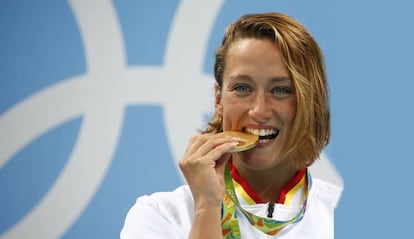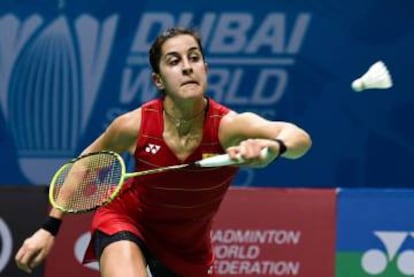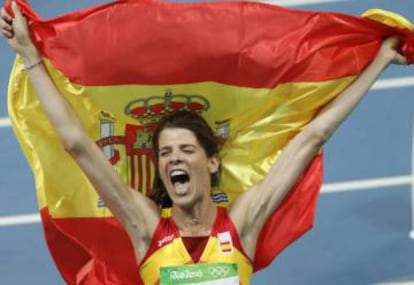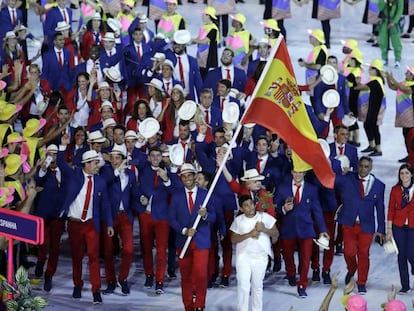Spain¡¯s female athletes dominate 2016
Nine of country's 17 medals at the Rio Olympics were won by women in a great year for Spanish sport

Spain's athletes displayed such a strong competitive streak during the Rio Olympics of 2016 that it was more surprising when they lost their battles than when they won. On top of that it was the women who led the way. They are a group of fighters for whom mere participation is not enough.

During the 2016 Rio Olympic Games, Spanish women continued their habit of outperforming male athletes in terms of medal count. This is the new normal in Spanish sport, where women are no longer pioneers or trailblazers ¨C now they are leaders.
While winning was in the genes of some male athletes, such as Rafa Nadal, who, despite his wrist injury, won the gold medal in tennis doubles with Marc L¨®pez, nine of Spain¡¯s 17 Olympic medals were won by female athletes.

On that impressive list were Carolina Mar¨ªn, Maialen Chourraut, Ruth Beitia, Mireia Belmonte, the female rhythmic gymnastics team, the women¡¯s basketball team, Eva Calvo, who took silver in taekwondo, and Lydia Valent¨ªn.
Arguably, it was Spain¡¯s most brilliant performance since the Barcelona Olympics in 1992. Spanish women also dominated London¡¯s 2012 Olympics ¨C winning 11 out of the 17 medals that went to Spain.
Canoeist Maialen Chourraut won a coveted gold medal, demonstrating her competitive fire and succeeding in not repeating the same mistakes that cost her the central place on the podium in 2012.
The women¡¯s basketball team won silver after the impossible-to-win final match they played against the United States, while the men¡¯s team beat out Australia for the bronze.
Meanwhile, Lydia Valent¨ªn took home a bronze medal in weightlifting, although she will have to wait a couple of years until the anti-doping tests are repeated, to know exactly which medal she won. This is something she is accustomed to: in 2012 in London she finished fourth in but was awarded the gold four years later, after the top three competitors were disqualified for doping. A similar incident also occurred in the 2008 Beijing Olympics.
MIREIA BELMONTE: Spain's first female Olympic champion swimmer
There¡¯s no denying that Mireia Belmonte, 26, is a star. Inspired by the two silver medals she won in London in 2012, in 2016 she finally took home the top prize in the 200m butterfly.
Despite her shoulder problems ¨C they are worn out from years of tough training ¨C she became Spain¡¯s first female Olympic champion in swimming. She also won bronze in the 400m medley, bringing her total medal count to four.
Now, she has got her mind set on Tokyo 2020.
CAROLINA MAR?N: Ambition, courage and consistency
Although badminton is not typically Spanish, Carolina Mar¨ªn, 23, made history in the sport which is usually dominated by Asian countries. She became the first European to win gold in the women¡¯s singles. Her coach, Fernando Rivas, ignored other people¡¯s opinions and worked with Mar¨ªn to ensure she would arrive at the Olympic finals able to give 100%.
The left-handed player stunned audiences and athletes alike with her incredible concentration and reflexes. The two-time world champion unites ambition and killer instincts to make her nearly unbeatable while under pressure.
RUTH BEITIA: arrival at the peak of athleticism at the age of 37
When Ruth Beitia raised the Spanish flag and started to celebrate her victory in Rio¡¯s athletics stadium, the first observation commentators made was about her age. She was 37-years-old and had became the oldest champion of female high jump. It was a way of recognizing the extraordinary persistence of the athlete from Cantabria, who has been able to hold her place as an elite athlete for more than a decade.

She briefly retired after she won fourth place in the London 2012 Olympics, but fortunately, her desire to win a medal brought her back to the stadium just a few months later. In Rio, she jumped 1.97m to become the champion, but it was the lowest winning height since 1980. In Spain, her record is 2.02m.
English version by Alyssa McMurtry.
Tu suscripci¨®n se est¨¢ usando en otro dispositivo
?Quieres a?adir otro usuario a tu suscripci¨®n?
Si contin¨²as leyendo en este dispositivo, no se podr¨¢ leer en el otro.
FlechaTu suscripci¨®n se est¨¢ usando en otro dispositivo y solo puedes acceder a EL PA?S desde un dispositivo a la vez.
Si quieres compartir tu cuenta, cambia tu suscripci¨®n a la modalidad Premium, as¨ª podr¨¢s a?adir otro usuario. Cada uno acceder¨¢ con su propia cuenta de email, lo que os permitir¨¢ personalizar vuestra experiencia en EL PA?S.
?Tienes una suscripci¨®n de empresa? Accede aqu¨ª para contratar m¨¢s cuentas.
En el caso de no saber qui¨¦n est¨¢ usando tu cuenta, te recomendamos cambiar tu contrase?a aqu¨ª.
Si decides continuar compartiendo tu cuenta, este mensaje se mostrar¨¢ en tu dispositivo y en el de la otra persona que est¨¢ usando tu cuenta de forma indefinida, afectando a tu experiencia de lectura. Puedes consultar aqu¨ª los t¨¦rminos y condiciones de la suscripci¨®n digital.









































